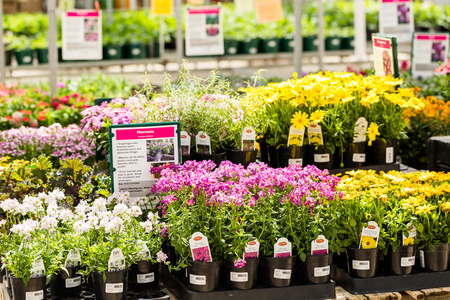Legal tips for your garden centre website
This subject might be a bit dry, yet it is very important: the legal aspects associated with (online) communication with your customers. And to avoid any misunderstanding: even if you don't have a webshop but just a simple website, you should take this into account.
We get a lot of questions about the legal documents that are required. We are also often asked for examples and “if we just can't arrange it”. The latter sounds simple, but is impossible to do:
- We are marketers and not lawyers, so it is not our field
- Legal documents must match your company exactly and even though almost every user on our platform sells garden furniture & geraniums, every company is different
- Things can change in your business and that can have an impact on legal documents
- Rules can change and depend on your business and working method, so documents will need to be updated
- We work in 6 countries and can barely keep up with the legislation in the Netherlands, let alone in other countries
In short, we cannot take it off your hands. We are happy to help you, so we have put a number of tips & links in this blog to help you. We will discuss the following topics:
- General terms and conditions garden industry
- Right of withdrawal webshop
- Privacy Policy
- Cookie policy
- Disclaimer
- GDPR & Security Checklist
Since we also have customers who aren’t based in the UK or EU we might need to clarify the GDPR abbreviation: GDPR stands for General Data Protection Regulation. It’s a set of rules & laws set by the EU to make sure personal data is processed correctly. If you’re from the US or Canada, you can just use the best practices outlined below.
At the very bottom of the post, we've added a few more resources and organisations that can help you further.

General terms & conditions
The general terms and conditions are of course the most important (legal) documents and should not be missing. In your general terms and conditions, you state how you deal with questions & complaints and you explain how you work.
If you already have a terms & conditions document available in your garden centre it’s important to upload this to your website or webshop: having two different terms & conditions is very confusing and is a shortcut to a range of legal trouble.
But what if you don’t have terms & conditions? You can then look online for a good example. A well-known website that can help with this is Rocket Lawyer. If you prefer to consult with a lawyer, you can find someone in your region who can help with this.
In the Garden Connect platform, the consumer is obliged to agree to your terms and conditions if he wants to place an online order. We can also send the conditions as a PDF with the confirmation emails from your webshop.

Right of withdrawal webshop
Another important aspect concerns the return of orders (or the withdrawal of an order). A number of years ago, new rules were drawn up by the EU for this. Before completing the order, you must clarify how consumers can return their orders to your centre. Even if you’re not based in the EU it might be a good idea to do that!
If you don’t have a withdrawal document you might be responsible for any shipping costs related to returning a product. The consumer then also has one year (!) to return his order - even if he uses the product in question. So leaving this out can turn out to be an expensive mistake!
Different rules apply to fresh products such as plants & flowers: it makes sense that you won't allow a bouquet to be returned, so exceptions have been made for this. This can be different from country to country.
For all other products, however, it is important that you organise two things well:
- You state (very) clearly on your website what the possible costs of returning are. An example sentence to use: “Depending on the weight and location, the return of garden furniture can cost around €150”
- You send a withdrawal form (PDF) with the order. This can be done via a link in the e-mail
If you want to know more about the right of withdrawal, you can take a look at the TermsFeed blog. They have a lot of information available about this and can help if you have any questions.
You can put the information about returns on a separate page on your webshop. You can also upload a PDF to the Garden Connect platform so that it is neatly displayed in the shopping cart.
Visitors are required to tick this box so that you can be sure that they have (or can) read it. That prevents discussion afterwards.

Privacy policy
In a privacy policy, you clearly state what you do with the personal data of your customers and website visitors, why you store them and how you do that. With the introduction of the GDPR legislation (in the EU and UK), it is very important to explain this properly to your customers and website visitors.
There are many online tools that can help you draw up a good privacy policy:
If you go through the steps on these websites, a document will appear that you can use on your website. Normally you put the privacy policy somewhere in the footer of your website so that it can be reached from every page.
As soon as you start advertising, platforms such as Google Ads check whether you have a good privacy policy. In addition to being required by law, they also force you to go in the right direction.

Cookie policy
When we talk about cookies, we're not talking about Cookiemonster. Almost every website uses cookies these days and thanks to European legislation you are bombarded with cookie notifications when you open a website.
We do not know whether it is useful, but a cookie policy & notification is mandatory to place on your website. You can easily generate a cookie policy via this website.
Keep in mind that a cookie policy must be updated if you are going to use third-party plugins. Will you make your cookie policy today and will you place an Instagram plugin on your website tomorrow? Then there is a good chance that your cookie policy is no longer correct.

Disclaimer
A disclaimer is a statement that disputes the correctness of certain information. Disclaimers are often included on websites and other documents to clarify what information can be trusted.
A disclaimer tells website visitors that they should not act solely based on what they read on the site. It also protects you from liability if something goes wrong or if there are errors in the information provided.
For example, if you state that a plant can tolerate some sun, a customer may come back to you to complain about a plant that has died from prolonged exposure to sunlight. Because how much sun is "some sun"?
It is of course important to know that disclaimers do not protect you from all liability. Still, it's a good idea to include a disclaimer on your site.
Visit the list of resources at the bottom of this page to find a website or partner that can create a custom policy that fits your needs.
Handy: GDPR & security checklist
To help you comply with all these rules, we have created a GDPR & security checklist. You can open it via this link. By going through this checklist - which will take about 30 minutes - you'll have a good idea of things you have in order or should be doing.
In the GDPR & security checklist, we discuss things such as:
- Security of your systems, also in your garden centre
- Your webshop and the legal requirements
- Processing customer data
This checklist is free to use, but we only help our own customers on their way after completing it.
If you complete the checklist, we can also display a good cookie notification on your website - then that's also taken care of!

Useful websites & resources
We have listed a number of useful websites & resources to help you further:
- Cookie Policy Generator
- GDPR.EU
- ICO UK
- Privacy Policies.com
- Privacy Policy Generator
- Rocket Lawyer
- TermsFeed
There are of course plenty of other websites and companies that can help you, but we are familiar with the above websites & organizations.
No legal advice
Keep in mind that we are happy to help you, but we are not lawyers. When in doubt, it is best to ask a lawyer for advice.



